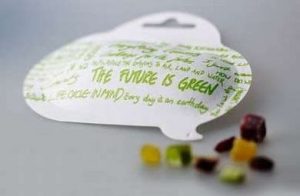
Right Sizing of Packages : A Case Study
The company knew that assessing progress in packaging and looking at the full life cycle of packaging emissions was crucial to getting a full picture of their products’ carbon footprints.

The company knew that assessing progress in packaging and looking at the full life cycle of packaging emissions was crucial to getting a full picture of their products’ carbon footprints.

REBBL is a leading member of the Climate Collaborative, which represents a cohort of natural products industry companies
working to reverse climate change through climate action commitments in nine key areas, including packaging. They
partnered with Trayak to aid companies in developing sustainable packaging choices. The project involved using a life cycle
assessment that compares the impacts of a bottle that contains either 0% or 50% post-consumer recycled (PCR) content.

Retort sterilization, also known as canning, is a well established thermal process for in package sterilization of low acid food products. Retort machine is a pressure vessel used to commercially sterilize food after it has been packed into a container and the container has been hermetically sealed. The method of sterilization is a thermal based process or the application of high heat to the product. The high temperature in the sterilization process destroys pathogenic organisms that may be present in the food product.

In this case study, the effect of pandemic on the F&B consumer buying pattern has been discussed & the role of packaging & branding has been emphasized. Some tips to enhance packaging on a case -to-case basis is also presented.

One of the challenges of incorporating recycled content into the product design is preserving the end product’s mechanical performance properties. It is imperative to educate stakeholders of effective solutions to use and upcycle waste plastic streams. Kraton’s styrenic block copolymers show excellent recyclability, enabling recyclable end product design, increase of post-consumer resin (PCR) content and repeated reuse of recycled plastics across a wide range of applications.

Material choices define the sustainability of our packaging products

The Coronavirus pandemic has posed a severe health problem globally. This health crisis has placed a special emphasis on the need to take extra precautions

Quality is one of the biggest differentiators in the packaging industry. Other factors matter too of course – cost efficiency, sustainability, lead times – but ultimately if packaging fails the quality test, it can jeopardize a whole run, and a customer relationship with it. In some sectors – pharmaceuticals for example – packaging faults can have even more significant consequences.

Modified atmospheric packaging technology is a well-established and gaining its importance day by day in food industry. Although packaging serves multiple functions, the most important purpose it should serve is ‘Extending the shelf life of food’. Food wastage is one of the largest contributors to greenhouse gas emissions and also risks food security. Eka Global’s high barrier Longevity Packaging plays a vital role in protecting & preventing the food from getting spoiled. Appropriate food processing and our packaging technology together can be used for extending shelf life of various food products.

Manufacturers in flexible packaging industry are exploring various ways to drive sustainability in flexible packaging. Extensive developments and machine trials are happening at different levels across the value chain of packaging. Be it right from Raw Material producers, Film Producers, Convertors till Brand Owners, all are aligned and focused on how to make the flexible packaging sustainable and / or eco- friendly.
Same polymeric family laminates, Monolayer laminates, Paper based packaging, In-Mould labelled cups / glasses-based packaging, +50micron thickness secondary packaging are few of the areas where our Indian manufacturers are putting efforts to make the packaging sustainable aligned with sustainability regulations.
Films Producers plays vital role in this sustainability journey having more responsibilities to develop specialty films / base substrates for any of the packaging that is being evaluated for sustainable packaging. Developing appropriate film or base substrate for any downstream process is the first step to start this sustainability journey.
Through this article, we shall be looking on various aspects of developments going on in films manufacturing as a solution towards sustainability.

Family owned and run coffee roaster, Rombouts, combines quality, innovation and sustainability with a packaging process that increases production efficiencies and enhances flavor.

Plastics play a key role in protecting people, especially front line workers, during the COVID-19 pandemic. Informal waste pickers are particularly vulnerable to the coronavirus pandemic. Corporations are rethinking recycling plans and sustainability commitments in the face of economic turmoil. The increase in single-use plastics will have long-term impacts. However which single use plastics will be not banned needs to be seen